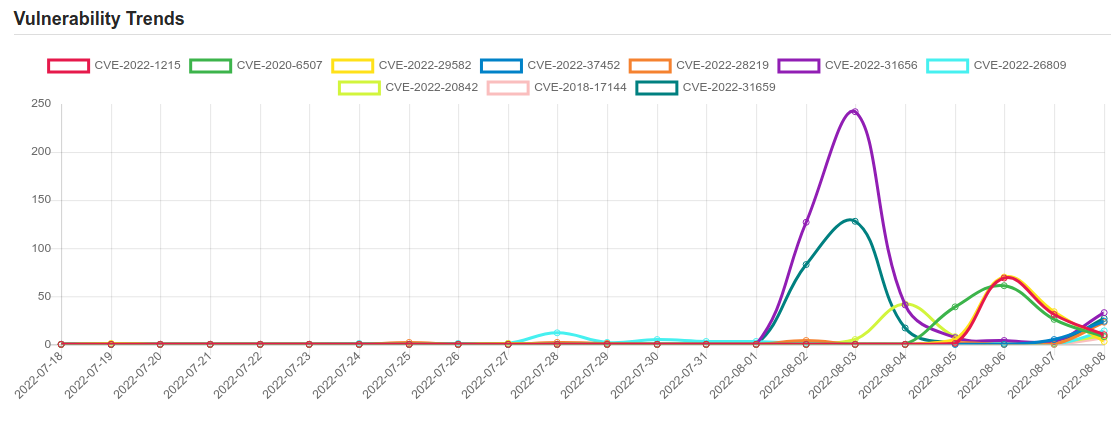Daily Vulnerability Trends: Tue Aug 09 2022

| CVE NAME | CVE Description |
| CVE-2022-26809 | Remote Procedure Call Runtime Remote Code Execution Vulnerability. This CVE ID is unique from CVE-2022-24492, CVE-2022-24528. |
| CVE-2022-20842 | No description provided |
| CVE-2018-17144 | Bitcoin Core 0.14.x before 0.14.3, 0.15.x before 0.15.2, and 0.16.x before 0.16.3 and Bitcoin Knots 0.14.x through 0.16.x before 0.16.3 allow a remote denial of service (application crash) exploitable by miners via duplicate input. An attacker can make bitcoind or Bitcoin-Qt crash. |
| CVE-2022-31659 | VMware Workspace ONE Access and Identity Manager contain a remote code execution vulnerability. A malicious actor with administrator and network access can trigger a remote code execution. |
| CVE-2022-35142 | An issue in Renato v0.17.0 allows attackers to cause a Denial of Service (DoS) via a crafted payload injected into the Search parameter. |
| CVE-2022-31661 | VMware Workspace ONE Access, Identity Manager and vRealize Automation contain two privilege escalation vulnerabilities. A malicious actor with local access can escalate privileges to ‘root’. |
| CVE-2022-31660 | VMware Workspace ONE Access, Identity Manager and vRealize Automation contains a privilege escalation vulnerability. A malicious actor with local access can escalate privileges to ‘root’. |
| CVE-2022-34918 | An issue was discovered in the Linux kernel through 5.18.9. A type confusion bug in nft_set_elem_init (leading to a buffer overflow) could be used by a local attacker to escalate privileges, a different vulnerability than CVE-2022-32250. (The attacker can obtain root access, but must start with an unprivileged user namespace to obtain CAP_NET_ADMIN access.) This can be fixed in nft_setelem_parse_data in net/netfilter/nf_tables_api.c. |
| CVE-2022-35143 | Renato v0.17.0 employs weak password complexity requirements, allowing attackers to crack user passwords via brute-force attacks. |
| CVE-2022-35144 | Renato v0.17.0 was discovered to contain a cross-site scripting (XSS) vulnerability. |
| CVE-2022-33636 | No description provided |
| CVE-2016-5195 | Race condition in mm/gup.c in the Linux kernel 2.x through 4.x before 4.8.3 allows local users to gain privileges by leveraging incorrect handling of a copy-on-write (COW) feature to write to a read-only memory mapping, as exploited in the wild in October 2016, aka “Dirty COW.” |
| CVE-2022-35796 | No description provided |
| CVE-2022-33649 | No description provided |
| CVE-2022-1215 | A format string vulnerability was found in libinput |
| CVE-2020-6507 | Out of bounds write in V8 in Google Chrome prior to 83.0.4103.106 allowed a remote attacker to potentially exploit heap corruption via a crafted HTML page. |
| CVE-2022-29582 | In the Linux kernel before 5.17.3, fs/io_uring.c has a use-after-free due to a race condition in io_uring timeouts. This can be triggered by a local user who has no access to any user namespace; however, the race condition perhaps can only be exploited infrequently. |
| CVE-2022-37452 | Exim before 4.95 has a heap-based buffer overflow for the alias list in host_name_lookup in host.c when sender_host_name is set. |
| CVE-2022-28219 | Cewolf in Zoho ManageEngine ADAudit Plus before 7060 is vulnerable to an unauthenticated XXE attack that leads to Remote Code Execution. |
| CVE-2022-31656 | VMware Workspace ONE Access, Identity Manager and vRealize Automation security bypass | CVE-2022-31656 |
A considerable amount of time and effort goes into maintaining this website, creating backend automation and creating new features and content for you to make actionable intelligence decisions. Everyone that supports the site helps enable new functionality.
If you like the site, please support us on Patreon using the button below

To keep up to date follow us on the below channels.




